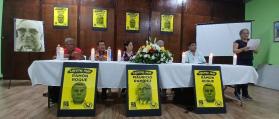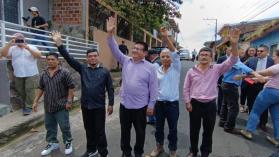"An Alarming Panorama": Violence and disinformation pervade 2021 election
The recent killing of opposition party members in the lead up to legislative and municipal elections in El Salvador on Sunday has drawn the attention of Members of Congress, who recently expressed concerns to the State Department about an electoral climate dominated by “political violence, intimidation, and corruption.”
The February 28 elections are the first in which President Nayib Bukele’s Nuevas Ideas (New Ideas) party will compete and have the potential to further embolden Bukele, who has thus far only been able to count on the support of a small right-wing party, GANA, in the legislature. A big win for his party in the legislative body would accord him greater influence over the next election of the Attorney General and Supreme Court magistrates, who have frequently challenged his attempts to run roughshod over the law - and whose rulings he has frequently defied.
In a February 24 letter to Secretary of State Antony Blinken, a group of fifteen Democratic lawmakers called for the State Department to issue “a broad denouncement and swift condemnation” of threats to El Salvador’s democracy, which had seen slow but steady advancements in electoral transparency and accessibility since the 1992 Peace Accords that ended a twelve-year armed conflict; Bukele recently dismissed the historic accords as a “farce.”
Recent events, including on January 31, when gunmen opened fire on a group of campaign volunteers from the leftist Farabundo Martí National Liberation Front (FMLN), threaten to turn back the clock.
“The political dialogue has devolved into themes of intolerance, violence, bribery, and corruption,” wrote the Members of Congress, noting that “vitriol” espoused by President Bukele and his supporters has “continued unabated” after the attack, for which three employees of the Bukele administration, including a member of the National Civilian Police, are being charged for the homicides.
In recent months, civil society organizations like Professionals for El Salvador (PROES) and others have warned of an “alarming panorama” in which “the rule of law is rapidly deteriorating because of Bukele’s disregard for legal norms, the separation of powers, abuse of public funds, and clearly fraudulent actions,” such as illegally withholding public campaign funds to opposition parties. PROES, an organization of economists and social scientists, has evaluated that the February 28 election will be El Salvador’s “most unequal and oppressive of the 21st century.”
Bukele’s strategy for winning seats in the legislature has been to “play the victim to an alleged fraud being planned against them, disparage and issue death threats against magistrates of the Supreme Electoral Tribunal” in addition to multiple violations of campaign law.
In their letter to Blinken, U.S. lawmakers drew parallels between Bukele and Trump. “As our own nation tragically witnessed, the utilization of misinformation and violence to assert power and legitimacy poses significant danger to democracies,” they wrote. “Misplaced disillusionment with traditional democratic norms, institutions, and processes – fueled by lies, propaganda, and conspiracy – is a troubling worldwide trend.”
Julio Olivo, a magistrate for the independent electoral authority, the Supreme Electoral Tribunal (TSE) who reports that he is receiving death threats from a Nuevas Ideas activist, told Salvadoran press earlier this week that the Bukele administration had attempted in several ways to infiltrate and sabotage the information system that will be used to count Sunday’s votes, including by intentionally running faulty simulations. According to Olivo, “Their idea was to penetrate [the system] through technicians, through contractors. When they didn’t achieve it, they started to talk about fraud, to talk about system failures.”
The February 24 letter to Secretary Blinken, signed by Jimmy Panetta (D-CA), James McGovern (D-MA), Raúl Grijalva (D-AZ), Jim Costa (D-CA), Ilhan Omar (D-MN), Mark Pocan (D-WI), David Price (D-NC), Jan Schakowsky (D-IL), Salud Carbajal (D-CA), Henry “Hank” Johnson (D-GA), David Trone (D-MD), Jesús “Chuy” Garcia (D-IL), Anna Eshoo (D-CA), Thomas Suozzi (D-NY), Jamie Raskin (D-MD), was the latest in a stream of critiques from Congress.
Chair of the Western Hemisphere subcommittee of the House Foreign Affairs committee Albio Sires and Norma Torres, sent a letter to Bukele earlier this month condemning the violence that rocked the country on January 31, including an attack on a Doctors Without Borders staff in San Salvador. Sires and Torres called on Bukele “not to stoke divisions in the interest of political gain.”
Congress also voted in December to restrict Foreign Military Financing to El Salvador for the first time since the end of the war in light of Bukele’s authoritarian tendencies and the creeping return of the military into domestic political affairs, as exemplified by the Armed Forces occupying the Legislative Assembly on February 9, 2020 in an attempt to strongarm lawmakers into approving a security loan while Bukele called for a “popular insurrection” against them.
The only major international observer mission for this election is organized by the Organization of American States (OAS); the United Nations and the EU will not participate as they have in the past, though the EU is sending a small delegation. Salvadoran media has reported that the head of OAS mission María Eugenia Vidal was previously investigated in Argentina for falsifying campaign donations for the conservative political alliance Cambiemos.
The final vote count is expected to take many days, opening the door to Bukele to define a narrative and mobilize his base accordingly. A series of rulings by the conservative Supreme Court, which progressive grassroots movements in El Salvador understood as being designed to stymie the momentum of the FMLN following their presidential victories in 2009 and 2014, have twisted the legislative elections in particular into a system described as “convoluted” and “bizarre” and extended the timeframe for final results to be delivered by the TSE.
For further background, please read A Guide to El Salvador's 2021 Legislative, Municipal, and Central American Parliamentary Elections (here in English) // Para mayor información, favor de leer Un Guía a las Elecciones Legislativas, Municipales y al Parlamento Centroamericano en El Salvador 2021 (aquí en español)
For news and analysis from community media and grassroots social movements on election day and as votes are counted, follow CISPES on Facebook and Twitter.

 "I am a CISPES supporter because continuing to fight for social justice and a more people-centered country means continuing the dream and sacrifice of thousands of my fellow Salvadorans who died for that vision.” - Padre Carlos, New York City
"I am a CISPES supporter because continuing to fight for social justice and a more people-centered country means continuing the dream and sacrifice of thousands of my fellow Salvadorans who died for that vision.” - Padre Carlos, New York City

